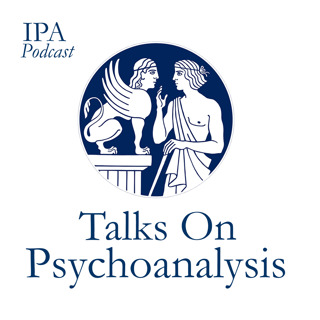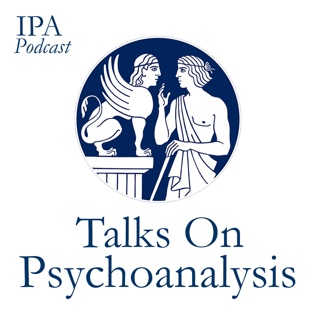
The Mystery, Again - Mariano Horenstein
"X". Calle Alcalá, Madrid. Photograph by Ana M. Martín Solar. With the evocative title “Once Again, the Mystery”, the Argentine psychoanalyst Mariano Horenstein poses the equally enigmatic question: How do we listen to the language of sexuality today? Through an exploration of the relationship between language and psychoanalysis and the historical transformation of the clinical paradigms that have shaped psychoanalytic listening to date: hysteria, in its origins, with its enigmatic language surrounded by silences, which inaugurated the analytical device; psychosis, which after the Second World War led to the expansion of the field, forcing us to give voice and testimony where the absence of repression predominated; the author shows us the trans clinic as a new paradigm that is currently emerging, not only because it requires the analyst to be heard, but also because it bursts onto the scene with its own voice and avatars of inclusive language, directly challenging psychoanalytic theory and practice, and thus bringing sexuality back to the centre of the psychoanalytic stage and debate. In 2022, “Once Again, the Mystery” won the biennial Carolina Zamora Prize awarded by the Asociación Psicoanalítica de Madrid, which recognised the author by inviting him to participate as one of the main speakers at the seventh Meeting of Spanish-speaking Psychoanalysts in 2024. Mariano Horenstein is a psychoanalyst with a teaching role at the Córdoba Psychoanalytic Association and the International Psychoanalytic Association. He is a former representative for Latin America on the IPA Board. He is the former editor-in-chief of Calibán-Revista Latinoamericana de Psicoanálisis. He is also the author of the books: ‘Psicoanálisis en lengua menor’ (Psychoanalysis in a Minor Language); ‘Brújula y diván. El psicoanálisis y su necesaria extranjería’ (Compass and Couch: Psychoanalysis and its Necessary Foreignness); ‘Funambulistas. Travesía adolescente y riesgo’ (Tightrope Walkers: Adolescent Journey and Risk); and ‘Conversaciones de diván’ (Couch Conversations). www.marianohorenstein.com This episode is presented in English and Spanish. Spanish You can download a copy of the paper here. This podcast series is produced by the International Psychoanalytical Association as part of the activities of the IPA Outreach Subcommittee. Chair: Gaetano Pellegrini. Podcast Coordinator: Florencia Biotti. Editing and Post-Production: Massimiliano Guerrieri. To stay informed about the latest podcast releases, please subscribe today.
14 Okt 35min

On Paternal Presence - Heribert Blass
In the wake of profound cultural change, the traditional image of the father has been destabilized, prompting renewed psychoanalytic reflection. No longer confined to authority alone, the paternal figure is now expected to embody both care and limit. What psychic space does the father occupy in the life of the child? In this episode, Heribert Blass explores fatherhood through a contemporary psychoanalytic lens. Drawing on clinical experience, interdisciplinary research, and cultural observation, he outlines a model of committed paternity that integrates emotional presence with symbolic function. From early play to Oedipal conflict, the father's task is to protect, to differentiate, and to support the child's path toward autonomy. Rather than fading, he emerges as a complex figure situated at the intersection of intimacy, separation, and symbolic function—and essential to the child's inner world. Heribert Blass, medical doctor, is a psychoanalyst for adults, children, and adolescents; a training and supervising analyst of the German Psychoanalytic Association and the IPA; also a specialist in psychosomatic medicine and psychotherapy, and psychiatry, working in private practice in Düsseldorf, Germany. He is the president-elect of the IPA and served as president of the European Psychoanalytic Federation from 2020 to 2024. His publications cover a wide range of topics, including male identity and sexuality, the image of the father, supervision, generativity both in clinical work and within psychoanalytic institutions, boundary violations, the relationship between internal and external reality, psychoanalysis and society (especially during the COVID-19 pandemic), as well as time and the experience of time. French German Italian Portoguese Spanish You can download a copy of the paper here This Podcast Series, published by the International Psychoanalytical Association, is part of the activities of the IPA Communication Committee and is produced by the IPA Podcast Editorial Team. Co-Editors: Gaetano Pellegrini and Nicolle Zapien. Editing and Post-Production: Massimiliano Guerrieri. To stay informed about the latest podcast releases, please sign up today.
22 Jul 27min

What Can Psychoanalysis Offer to Alleviate Toxic Polarization - Harriet Wolfe
The current social, political and historical context offers many difficult challenges. We have experienced up close and from a distance awareness of a remarkable number of challenges including the wars, political unrest, growing socioeconomic inequities, climate catastrophe, and human and animal suffering. These times are also marked by polarized thinking, including among analysts, candidates and in our communities. An application of a psychoanalytically-informed method that rests on psychoanalytic clinical theory but focuses on group experiences of psycho-historical conflict as it continues in the present is offered as a means to facilitate deep and moving change when there is toxic polarization. In this episode, Dr. Harriet Wolfe presents a unique application of psychoanalytic thinking. She describes an interdisciplinary group that is international, intergenerational and diverse that meets periodically to apply analytic thinking to intractable large scale historical group traumas. This method, called the International Dialogue Initiative includes psychoanalysts but also others (e.g. economists, lawyers, diplomats, historians) who share stories and deeply listen with the purpose of gaining perspective on unmanageable feelings through exploring cases of traumatic residues. While others, including Freud have theorized application of psychoanalysis to groups, this particular use is novel and important in today’s times and speaks to how psychoanalysis can be truly psychoanalytic and at the same time be applied to political and social issues. Harriet Wolfe, M.D., is President of the International Psychoanalytical Association, Past President of the American Psychoanalytic Association, Clinical Professor of Psychiatry and Behavioral Sciences at the University of California San Francisco, and Training and Supervising Analyst at the San Francisco Center for Psychoanalysis. Her scholarly interests include clinical applications of psychoanalytic research, organizational processes, female development, and therapeutic action. She has co-authored a number of psychoanalytically informed guided activity workbooks for children, parents and teachers to help children cope with natural and manmade disasters. She has a private practice of psychoanalysis, and individual and couple’s psychoanalytic psychotherapy in San Francisco. This Podcast Series, published by the International Psychoanalytical Association, is part of the activities of the IPA Communication Committee and is produced by the IPA Podcast Editorial Team. Co-Editors: Gaetano Pellegrini and Nicolle Zapien. Editing and Post-Production: Massimiliano Guerrieri. To stay informed about the latest podcast releases, please sign up today. A subtitled version of this podcast is available on our YouTube channel: You can download a copy of the paper here.
26 Jun 18min

Confidentiality in Supervision – Ellen A. Sparer
What happens when the analytic setting—built on confidentiality and silence—meets the institutional demands of psychoanalytic training? Can the frame of supervision truly preserve the integrity of the analytic pact, or does it inevitably put it at risk? In this episode, Ellen Sparer explores a central paradox in psychoanalytic formation: the tension between the confidentiality of analytic work and the structural requirements of supervision. Drawing from her experience at the Paris Psychoanalytic Institute, she asks whether supervision risks undermining the very foundation of the analytic situation—what Freud, in An Outline of Psychoanalysis, described as a pact in which “the patient’s sick ego promises us the most complete candour…” while “we, on the other hand, assure him of the strictest discretion.” Through reflections on André Green, José Bleger, and Freud’s concept of disavowal, Sparer examines what she calls a “noisy contradiction”—a situation in which the analyst-in-formation becomes both observer and observed, and where the silence essential to the analytic space is disturbed by institutional structure. She invites us to consider the Institute’s role as a symbolic third—present, structuring, yet potentially unsettling—and to ask whether we can live with this paradox without disavowing its presence. Rather than resolving the contradiction, this episode engages with it directly, as Ellen Sparer offers a nuanced and courageous inquiry into a space of ethical tension, institutional inheritance, and potential transformation at the core of analytic formation. Ellen Sparer is a training analyst at the Paris Psychoanalytic Society and former Director of the Paris Institute of Psychoanalysis, a role she held until March 2025. She has served as co-chair of the Applicant Societies Committee of the IPA, where she contributed to the evaluation of emerging psychoanalytic groups seeking IPA recognition. She is also an Associate Editor of the International Journal of Psychoanalysis, where she’s part of the Education Section, and a scientific advisor for the Jahrbuch of Psychoanalysis. From 2009 to 2019, she was on the editorial board of the Revue Française de Psychanalyse. Most recently, she was elected to the IPA Board as a European representative. Her scientific work and publications focus on the unconscious ego, supervision, training, the frame, and ethics. She has also written on countertransference phenomena, including the function of the analyst’s dream in the treatment process. This Podcast Series, published by the International Psychoanalytical Association, is part of the activities of the IPA Communication Committee and is produced by the IPA Podcast Editorial Team. Co-Editors: Gaetano Pellegrini and Nicolle Zapien. Editing and Post-Production: Massimiliano Guerrieri.
5 Jun 25min

Building a Space for Thinking - Alberto Carrión García de Parada
What challenges face the patient and analyst in constructing the analytic space? How can the analyst navigate the interplay of intense emotional dynamics to enable meaningful transformation? In this article, titled "The Analyst and the Patient: Building a Space for Thinking", Alberto Carrión García de Parada, delves into the intricate process of building a shared analytic space. Drawing on his extensive experience in child and adolescent psychoanalysis and parent-infant psychotherapy, he examines the dynamic interplay of transference and countertransference, highlighting the analyst's active role in containing disturbing emotional and mental content. Integrating classical theories with contemporary developments, the article references key figures such as Wilfred Bion and León Grinberg to explore the evolution of the analytic process through shared emotional "storms" and the gradual dismantling of initial patient resistances. By emphasizing the importance of the analyst's reverie and countertransference awareness, the article underscores how the analytic setting can serve as a transformative framework for emotional containment and psychic development. Alberto Carrión García de Parada is a Clinical Psychologist and Training Psychoanalyst of the Madrid Psychoanalytical Association (APM). He is also a child and adolescent psychoanalyst, and has a special interest in parent-infant psychotherapy. He has directed the children and adolescents Department and is currently president of the APM. He participates as a lecturer in an annual cycle on cinema and psychoanalysis organised by the Colegio Mayor Isabel de España. He has given many lectures in psychoanalytic forums and is the author of several articles in the journal of psychoanalysis of the APM as well as in other psychoanalytic psychotherapy journals. Some of these articles are: The role of the psychotherapist in psychoanalytic psychotherapy with children and adolescents (2008). From play to sport (2012). The child psychoanalyst. Transformations in the mother-baby bond (2018). Frame and reverie (2020). Other articles written in collaboration with several authors: Adolescence and melancholic functioning (2010). Enuresis: a manifestation of childhood regression (2011). He has participated in the book Interrogated Parentality, edited by the APM (2020). A subtitled version of this podcast is available on our YouTube channel: https://youtube.com/playlist?list=PLhxiwE76e0QaOquX3GujdwNLFsgxUQNXz&si=yf381EDu3pess6Yz This episode has also been published in Spanish. This Podcast Series, published by the International Psychoanalytical Association, is part of the activities of the IPA Communication Committee and is produced by the IPA Podcast Editorial Team. Co-Editors: Gaetano Pellegrini and Nicolle Zapien. This episode has been produced in collaboration with Ana Maria Martin Solar. Editing and Post-Production: Massimiliano Guerrieri. To stay informed about the latest podcast releases, please sign up today.
16 Jan 29min

The Desire and Passion for a Child - Dr. Patricia Alkolombre
In today’s context of reproductive technologies, one has the idea that we might have more control over the process of reproduction. No longer necessarily linked to sexuality, reproduction and parenthood can occur in a multitude of ways, pushing the boundaries of what was not thought to be possible or acceptable. These biotechnical innovations have not only changed the ways that one can become a parent but also necessarily suggest new areas for psychoanalytic theorizing. In this podcast episode, Dr. Patricia Alkolombre discusses how the desire for a child has become in some cases, the passion for a child “at any price”, made more urgent and concentrated as the biotechnical innovations offer us the sense that we have control over our bodies and their reproductive and gestational functions in new ways. She discusses what this means for psychoanalytic understandings of gender, parenthood, femininity, loss, disappointment, narcissism and our understandings of ourselves and how this new era of reproduction ushers in a new set of clinical issues. Dr. Patricia Alkolombre holds a PhD in Psychology from the University of Salvador. She is a Training and supervising analyst of the Argentine Psychoanalytic Association and is the current Overall Chair of the IPA Committee on Women and Psychoanalysis. She gives seminars in many post-graduate institutions and mental health centers in Buenos Aires and in psychoanalytic institutions abroad, among them are the Psychoanalytic Association of Guadalajara, the Brazilian Society of Porto Alegre, Brazil. She is the author and editor of several books. Among them are: The Desire and Passion for a Child: Psychoanalysis and Contemporary Reproductive Techniques (Routledge, 2023) in Spanish and english. She is also the author and the editor of the book Travesías del cuerpo femenino (2012) (Declared of Interest in Culture and Health by the Legislature of the City of Buenos Aires). She is co-author of Changing sexualities and parental function in the twenty first century (Routledge 2017) and of Psychoanalytic Explorations of what women want today: femininity, desire, and agency (Routledge 2022). A subtitled version of this podcast is available on our YouTube channel: https://youtube.com/playlist?list=PLhxiwE76e0QaOquX3GujdwNLFsgxUQNXz&si=yf381EDu3pess6Yz You can download a copy of the paper here: https://docs.google.com/document/d/1j-ANLupJF6b44NVmlC0XSfMMml7-sprb/edit?usp=sharing&ouid=100400904585889441765&rtpof=true&sd=true This Podcast Series, published by the International Psychoanalytical Association, is part of the activities of the IPA Communication Committee and is produced by the IPA Podcast Editorial Team. Co-Editors: Gaetano Pellegrini and Nicolle Zapien. Editing and Post-Production: Massimiliano Guerrieri. To stay informed about the latest podcast releases, please sign up today. This episode has also been published in Spanish. This episode has also been published in Portuguese.
21 Aug 202428min

Freud, his passion for travel, and its impact on psychoanalytic discoveries - Patricia O'Donnell
What is it that is so captivating about travel? In Freud’s travel letters chronicling his experiences over many decades in different countries, there are the seeds of the advance of non-clinical experiences of psychoanalysis. Travel takes us to another place with unfamiliar surroundings so that we might see anew that which we may otherwise take for granted. Awe and beauty are often experiences we have while abroad. And these are described by Freud over and over again in these captivating letters. In this podcast episode, Dr. Patricia O’Donnell discusses Freud’s travel letters and his musings on the pleasures of travel, art, and architecture, as experiences that inspire awe and transcendence. She links these experiences to the unconscious fantasizing that stems from curiosity, rooted in infantile sexuality and that gives rise to the desire to know and triggers of experiences of passion. Dr. Patricia O’Donnell is a psychiatrist, a full member and training analyst of the Argentine Psychoanalytic Association and a member of the International Psychoanalytic Association. She is also an Associate Professor at the Department of Mental Health at the Hospital de Clinicas Jose de San Martin. She has presented papers at national and international conferences and delivered workshops and lectures on psychoanalytic art research. She has written numerous articles and co-authored books on topics ranging from psychoanalysis and creativity, art and literature. A subtitled version of this podcast is available on our YouTube channel: https://youtube.com/playlist?list=PLhxiwE76e0QaOquX3GujdwNLFsgxUQNXz&si=yf381EDu3pess6Yz You can download a copy of the paper here: https://docs.google.com/document/d/1-dthE_sMLxYjtDl4uWWTuEdYD4THtjSN/edit?usp=share_link&ouid=100400904585889441765&rtpof=true&sd=true This Podcast Series, published by the International Psychoanalytical Association, is part of the activities of the IPA Communication Committee and is produced by the IPA Podcast Editorial Team. Co-Editors: Gaetano Pellegrini and Nicolle Zapien. Editing and Post-Production: Massimiliano Guerrieri. To stay informed about the latest podcast releases, please sign up today. This episode has also been published in Spanish.
25 Jun 202422min




















